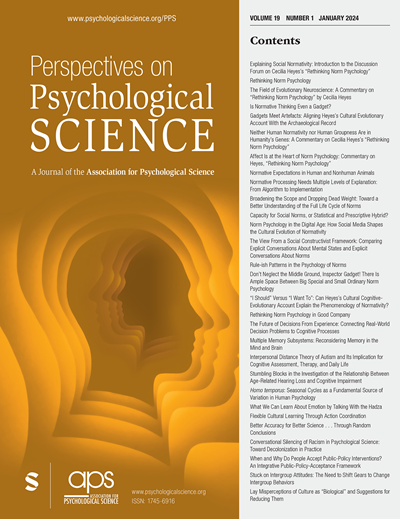生成式人工智能聊天机器人能模仿人类的联系吗?关系科学的视角
IF 8.4
1区 心理学
Q1 PSYCHOLOGY, MULTIDISCIPLINARY
引用次数: 0
摘要
能够维持复杂对话的生成式人工智能的发展,为同伴聊天机器人创造了一个蓬勃发展的市场,有望实现社交和情感联系。这些产品的吸引力引发了一个问题,即聊天机器人能否实现亲密关系的功能。支持者认为,与聊天机器人的关系可以像人类之间的关系一样有意义,而批评者则认为,聊天机器人会分散人们与真正的联系的注意力。该分析运用了50多年来对亲密关系研究的理论工具来评估人类与聊天机器人的互动在多大程度上满足了亲密关系的定义并实现了亲密关系的功能。人类和聊天机器人之间的互动确实具有一些亲密关系的特征:人类和聊天机器人可以相互影响,并随着时间的推移进行频繁而多样的对话。聊天机器人可以以人类认为是支持的方式做出回应,产生联系感和成长机会。然而,由于聊天机器人只对用户提出肤浅的要求,与它们的关系无法提供与合作伙伴谈判和牺牲的好处,而且可能会加强不良行为。关注用户、聊天机器人及其交互特征的研究对于确定这些关系对谁有益或有害至关重要。本文章由计算机程序翻译,如有差异,请以英文原文为准。
Can Generative AI Chatbots Emulate Human Connection? A Relationship Science Perspective
The development of generative artificial intelligence capable of sustaining complex conversations has created a burgeoning market for companion chatbots promising social and emotional connection. The appeal of these products raises questions about whether chatbots can fulfill the functions of close relationships. Proponents argue that relationships with chatbots can be as meaningful as relationships between humans, whereas critics argue they are a dangerous distraction from genuine connections. This analysis applies theoretical tools from more than 50 years of research on close relationships to evaluate the extent to which human–chatbot interactions meet the definition of and fulfill the functions of close relationships. Interactions between humans and chatbots do possess some characteristic features of close relationships: Humans and chatbots can influence each other and engage in frequent and diverse conversations over time. Chatbots can be responsive in ways humans perceive as supportive, generating feelings of connection and opportunities for growth. Yet because chatbots make only superficial requests of their users, relationships with them cannot provide the benefits of negotiating with and sacrificing for a partner and may reinforce undesirable behaviors. Research that attends to the characteristics of users, chatbots, and their interactions will be crucial for identifying for whom these relationships will be beneficial or harmful.
求助全文
通过发布文献求助,成功后即可免费获取论文全文。
去求助
来源期刊

Perspectives on Psychological Science
PSYCHOLOGY, MULTIDISCIPLINARY-
CiteScore
22.70
自引率
4.00%
发文量
111
期刊介绍:
Perspectives on Psychological Science is a journal that publishes a diverse range of articles and reports in the field of psychology. The journal includes broad integrative reviews, overviews of research programs, meta-analyses, theoretical statements, book reviews, and articles on various topics such as the philosophy of science and opinion pieces about major issues in the field. It also features autobiographical reflections of senior members of the field, occasional humorous essays and sketches, and even has a section for invited and submitted articles.
The impact of the journal can be seen through the reverberation of a 2009 article on correlative analyses commonly used in neuroimaging studies, which still influences the field. Additionally, a recent special issue of Perspectives, featuring prominent researchers discussing the "Next Big Questions in Psychology," is shaping the future trajectory of the discipline.
Perspectives on Psychological Science provides metrics that showcase the performance of the journal. However, the Association for Psychological Science, of which the journal is a signatory of DORA, recommends against using journal-based metrics for assessing individual scientist contributions, such as for hiring, promotion, or funding decisions. Therefore, the metrics provided by Perspectives on Psychological Science should only be used by those interested in evaluating the journal itself.
 求助内容:
求助内容: 应助结果提醒方式:
应助结果提醒方式:


